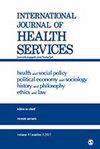健康冲击与医疗资源不平衡增长:来自中国SARS疫情的证据。
IF 3.4
4区 医学
Q1 HEALTH CARE SCIENCES & SERVICES
International Journal of Health Services
Pub Date : 2022-01-01
Epub Date: 2021-01-10
DOI:10.1177/0020731420978871
引用次数: 2
摘要
自2003年非典疫情爆发以来,中国政府加大了对医疗卫生体系的投入。然而,新冠肺炎疫情暴露了中国卫生资源的地域分布不均。我们使用差异中的差异策略检查了SARS流行的时空变化。实证结果表明,与未报告SARS病例的城市相比,外源性卫生冲击显著增加了受影响城市的医疗资源供给。我们提供了多个稳健性测试来检验主要发现的有效性。进一步的研究表明,其机制是由于SARS事件增加了疫情城市的财政自主权,从而为地方政府增加卫生资源提供了激励。与此同时,卫生冲击对只有输入病例的地区的影响小于感染地区。这些发现为卫生资源分配不平等提供了可能的解释。本文章由计算机程序翻译,如有差异,请以英文原文为准。
Health Shocks and Unbalanced Growth of Medical Resources: Evidence From the SARS Epidemic in China.
Since the outbreak of the SARS epidemic in 2003, the Chinese government has increased inputs to bolster the health care system. However, the COVID-19 pandemic has exposed the geographic maldistribution of health resources in China. We examine the spatial and temporal variation of the SARS epidemic using a difference-in-differences strategy. Our empirical results show that, compared with cities without SARS case reports, exogenous health shocks significantly increased the affected cities' medical resources supply. We provide multiple robustness tests to examine the validity of the main findings. Further study shows that the mechanism is because the SARS event increased the financial autonomy of the epidemic-affected cities, thus providing an incentive for local governments to increase health resources. Meanwhile, health shocks have little influence on the regions with only imported cases than the infected area. These findings provide a possible explanation for the inequality in the distribution of health resources.
求助全文
通过发布文献求助,成功后即可免费获取论文全文。
去求助
来源期刊
CiteScore
4.50
自引率
2.90%
发文量
41
审稿时长
>12 weeks
期刊介绍:
The International Journal of Health Services is a peer-reviewed journal that contains articles on health and social policy, political economy and sociology, history and philosophy, ethics and law in the areas of health and well-being. This journal is a member of the Committee on Publication Ethics (COPE).

 求助内容:
求助内容: 应助结果提醒方式:
应助结果提醒方式:


